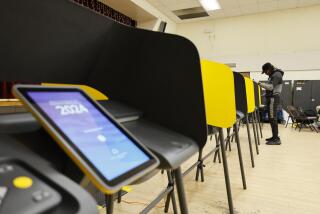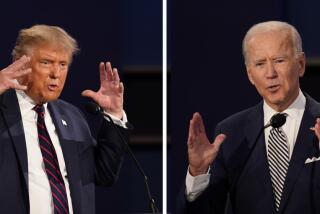Democrats, facing a big candidate field, ask: Who can beat Trump?
Marcus Scott is looking for a Democratic presidential candidate who will be rude to Donald Trump. Kara LaMarche wants an upbeat, positive approach. Ben Dion wants a nominee with experience and gravitas. Linds Jakows has had it with older white men in power.
Those voters, like fellow Democrats across the country, seek very different things in the big and growing presidential candidate field. But they share one top priority: Picking a nominee who will beat President Trump in 2020.
For the record:
9:40 a.m. March 3, 2019This article states the year then-Vice President Joe Biden debated then-Rep. Paul Ryan as 2016. The debate was in 2012.
A year from now, on March 3, 2020, candidates will be competing for primary votes in California and eight other states in the first day of multistate voting. By then, the candidates will have been tested in the four early voting states of Iowa, New Hampshire, Nevada and South Carolina, where Democrats already have a curbside seat for the parade of candidates campaigning there.
Between now and then, much of the debate seems certain to focus on the elusive quality labeled “electability.”
Parties always want to win, of course, but Democratic loathing of Trump has pushed finding a winner way up the priority scale this year, recent polls show. Democratic voters say they’d prefer a candidate who can beat Trump to one who agrees with their position on any particular issue.
2020 candidates: Who’s in and who’s on the fence? »
Voters, however, have widely varying views about what electable means in 2020. To some, it is code for a safe, cautious choice — a centrist white male who presumably can speak to swing voters. To other Democrats, that’s a recipe for killing off excitement within the party’s young, diverse, progressive base, which needs to be mobilized to win in 2020.
The contrasting ideas about electability will come sharply into focus in the coming weeks if two late entrants to the 2020 race come off the sidelines. If former Rep. Beto O’Rourke jumps in, the 46-year-old Texan will represent a bid for generational change that could mobilize new voters in a way supporters compare to Barack Obama.
If Vice President Joe Biden runs, he will likely lean heavily on the case that his long experience makes the 76-year-old the party’s safest bet to win the White House.
“I believe he is the only person who could take on Trump and beat him,” said Dick Harpootlian, a South Carolina state senator and longtime Biden backer. “We’re going to need someone who can motivate the middle-of-the-road voter.”
Other Democrats believe the party must put up a candidate better equipped than the former vice president to speak to and harness the energy of the younger generation of voters that helped deliver victory to the party in the 2018 midterm elections.
“I truly believe this great nation is ready for change,” said Robyn Joppy, a business consultant who heard Biden speak at a Martin Luther King Jr. Day event in Washington, D.C. “I love him. But I think his time has come and gone.”
How many candidates will be in the field by the time actual voting starts is anybody’s guess. For now, 13 have joined the field or formed an exploratory committee. Half are senators — Elizabeth Warren of Massachusetts, Kirsten Gillibrand of New York, Kamala Harris of California, Cory Booker of New Jersey, Amy Klobuchar of Minnesota and Bernie Sanders of Vermont.
More candidates may soon get in the race, including former Colorado Gov. John Hickenlooper and Ohio Sen. Sherrod Brown, as well as Biden and O’Rourke.
The candidates are now pouring most of their effort into the four earliest-voting states. They face a daunting challenge when attention turns to California, because its large size gives a leg up to candidates who can afford television advertising.
Harris, Sanders and Biden, if he runs, could have an edge because they are already well known in the state. But because Democratic Party rules require all states to distribute their delegates proportionately, no candidate is likely to walk away with a lion’s share of California’s more than 400 convention delegates, the largest group from any state.
Most Democrats are highly confident of their ability to beat Trump in 2020, because of his low approval ratings and the high level of energy in their own ranks.
But a recent poll by Public Opinion Strategies, a Republican firm, provides a warning against overconfidence on the part of Democrats. Nationally the poll found just 45% of respondents approved of the job Trump was doing. But he fared better — 50% approved of him — in 12 swing states important to his reelection (Arizona, Florida, Georgia, Iowa, Michigan, Minnesota, Nevada, New Hampshire, North Carolina, Ohio, Pennsylvania, Wisconsin).
Some Democrats are skeptical about assessing candidates’ electability. Emily Cain, executive director of Emily’s List — a group that supports female Democratic candidates who support abortion rights — notes that detractors called Obama “unelectable” when he launched his upstart run to become the nation’s first black president.
“This is a subjective measure that comes back to, ‘This is a candidate who is not like what I previously experienced,’ ” she said.
Republicans’ experience in the 2016 primary was another cautionary tale against forecasting who is electable: Trump’s GOP rivals argued vociferously against him on grounds that he would surely lead the party to defeat in the general election.
“I’ve always found that voters generally think that the candidate I agree with most on the issues is the most electable,” said Neil Newhouse, a pollster at Public Opinion Strategies who advised Mitt Romney’s 2012 presidential campaign.
With Democratic activists now focused on electability as a key quality, candidates are trying to hone their arguments. Backers of Sanders and Warren, the two major candidates furthest to the left in the field, for example, believe they can galvanize the party’s progressive base while appealing to disaffected voters with their populist message.
Sanders, in a CNN town hall interview, said his agenda of guaranteed healthcare, minimum wage increases, and improved education and childcare “is a message that will resonate in many of the states that Trump won.”
Gillibrand, Klobuchar and, if he runs, Brown point to their successes winning rural, red counties in their 2018 Senate re-election campaigns.
“I’ve been able to bring our state together in a way where I bring the red and purple, blue places together,” Gillibrand said at a recent New Hampshire campaign event.
Harris alludes to her law enforcement background in making the case that she is best suited to taking on Trump:
“We’re going to need a fighter, and we’re going to need somebody who knows how to prosecute the case against this president,” she told supporters in Iowa recently.
Interviews with a sampling of voters as multiple candidates campaigned in New Hampshire recently showed Democrats approaching their choice with a wide array of theories about what it will take to beat Trump.
Marcus Scott, a lawyer in Nashua, N.H., thinks Democrats will have to fight fire with fire to beat the combative president. “You have to be rude to Donald Trump. You have to go down to the street level,” he said.
He liked the fighting spirit Biden showed when he debated Paul Ryan, the GOP vice presidential nominee in 2016 — an exchange that was widely seen as a win for Biden.
Kara LaMarche, a painter from Bedford, N.H., is looking for a younger, more optimistic candidate. She said she was drawn to the “positivity” of Booker — who argues that Democrats should not make the campaign all about attacking Trump — and put off by the angry tone she perceives in Warren.
“I like what she says, but I don’t like the way she says it,” LaMarche said. “She could sing ‘Happy Birthday,’ and it would sound negative.”
Some Democrats are drawn to candidates like Biden or O’Rourke because they seem more likely to reach across party lines.
“We need a candidate who understands the huge divide we have right now,” said Ben Dion, a high school teacher in Manchester, N.H. “We need a candidate who can represent everyone and act presidential.”
But Linds Jakows, a Sanders supporter in 2016, is looking for a candidate more progressive than Biden, but not Sanders this time around.
“I don’t think Biden is a progressive at all,” said Jakows, also of Manchester. “Bernie needs to let more women and people of color have a chance to make their voices heard.”
Still other Democrats have a touch of nostalgia for the charisma and inspiration they saw in the last Democrat in the White House.
Andrea Carroll, a retired teacher from Salisbury, Mass., who traveled to Portsmouth to see Harris, said the California senator was her No. 1 choice: “She reminds me of President Obama.”
CALIFORNIA COUNTDOWN
How California’s early primary illustrates the state’s political inferiority complex
California’s presidential primary: Here’s what you need to know
In Kamala Harris, a sequel to Ronald Reagan?
More to Read
Get the L.A. Times Politics newsletter
Deeply reported insights into legislation, politics and policy from Sacramento, Washington and beyond. In your inbox three times per week.
You may occasionally receive promotional content from the Los Angeles Times.







